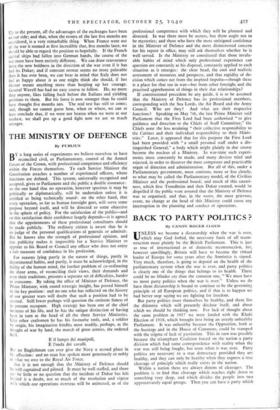THE MINISTRY OF DEFENCE
By PUBLIUS
BY a long series of experiments we believe ourselves to have reconciled civil, or Parliamentary, control of the Armed Forces of the Crown, with professional competence and efficiency within the Forces themselves. To each Service Minister the Constitution attaches a number of experienced officers, whose functions are defined. This system, universally recognised and accepted, gives to Parliament and the public a double assurance : on the one hand that no operation, however specious it may be politically or diplomatically, will be undertaken unless it is certified as being technically sound : on the other hand, that every operation, so far as human foresight goes, will serve some purpose beyond itself, and will be directed to some objective in the sphere of policy. For the satisfaction of the public—and on this satisfaction their confidence largely depends—it is agreed that the appointments of these professional consultants should he made publicly. The ordinary citizen is aware that he is no judge of the personal qualifications of generals or admirals. But he knows also the strength of professional opinion, and that publicity makes it impossible for a Service Minister to appoint to his Board or Council any officer who does not enjoy a fair measure of confidence in his profession.
For reasons lying partly in the nature of things, partly in departmental habits, and partly, it must be acknowledged, in the frailty of the human mind, the further problem of co-ordinating the three arms, of reconciling their views, their demands and even their traditions, presents a separate set of difficulties, harder to overcome. By taking the office of Minister of Defence, the Prime Minister, with sound strategic insight, has posted himself in the key position: and no one who has reflected on the history of our greater wars will doubt that such a position had to be created. Still fewer perhaps will question the eminent fitness of its present occupant. High strategy has been one of the chief interests of his life, and he has the unique distinction of having been in turn at the head of all the three Service Ministries. Like other craftsmen he has his favourite tools, and, a soldier by origin, his imagination kindles most readily, perhaps, at the thought of war by land, the march of great armies, the ordered field.
E ii lampo dei manipoli, E l'onda dei cavalli.
But no Englishman can ever give the Navy a second place in his affection: and no man has spoken more generously or nobly of what we owe to the Royal Air Force.
But it is not enough that the Ministry of Defence should be well captained and piloted. It must be well staffed, and there can be little or no question that the incident of Dakar has left behind it a doubt, not so much of the resolution and vigour With which our operations overseas will be animated, as of the professional competence with which they will be planned and directed. In war there must be secrets, but there ought not to be mysteries; and those who have the most unfeigned confidence in the Minister of Defence and the most disinterested concern for his repute in office, may still ask themselves whether he is well served. Is the Ministry so constituted that those invalu- able habits of mind which only professional experience can question are constantly at his disposal, constantly applied to each situation as it emerges: the clear head, the cool and realistic assessment of resources and prospects, and that rapidity of de- cision which comes not from the inspired impulse—though there is a place for that too in war—but from sober foresight and the practised apprehension of things in their due relationships?
If constitutional precedent be any guide, it is to be assumed that the Ministry of Defence has its professional members, corresponding with the Sea Lords, the Air Board and the Army Council. Who are they? And what are their respective functions? Speaking on May 7th, the late Prime Minister told Parliament that the First Lord had been authorised "to give guidance and direction to the Chiefs of Staff Committee," the Chiefs none the less setaining "their collective responsibility to the Cabinet and their individual responsibility to their Minis- tries." Later, it appeared that for this purpose the First Lord had been provided with "a small personal staff under a dis- tinguished General," a body which might plainly in due course become the nucleus of a Ministry. In war-time such experi- ments must constantly be made, and many devices tried and rejected, in order to discover the most competent and practicable organ of direction and administration. But all of this, under a Parliamentary government, must conform, more or less closely, to what may be called the Parliamentary model, of the Civilian Minister and the professional board; and much of this uneasi- ness, which first Trondheim and then Dakar created, would be dispelled if the public were assured that the Ministry of Defence was so organised, and that, in the worst, the most grievous, event, no change at the head of this Ministry could cause any interruption in the planning and conduct of operations.


























 Previous page
Previous page